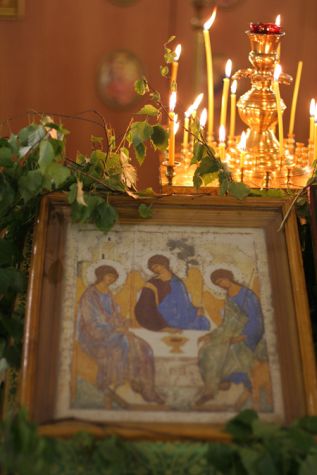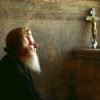Source: Antiochian Orthodox Deanery of the United Kingdom and Ireland
We have just passed through a great period of feasts. The season of Pascha is full of thanksgivings. The Church experiences again what those early Christians felt like when they realised that their Master was not dead but alive. And we have followed all that with the great celebration of the Ascension, and now the joys of Pentecost. What a time it has been!
Since Pascha the Epistle readings have been taken from the Acts of the Apostles. A brilliant concept! We have been recalling the early days of the Church, its staggering growth, but also its sufferings. All this was seen by St. Luke, the author of this remarkable book, as a direct result of that memorable day of Pentecost. We are told that the early Christians were ordered by Christ to do nothing until they had received the power of the Holy Spirit. So in the Acts we read of the fruit of that reception. All they did and said was inspired by the Holy Spirit.

The Acts is great reading, but it is not there for us to say “how great those days must have been, how I wish I had lived through them”. Rather the stories of conversions, preachings, missionary journeys and rapid church growth are there to inspire us – for we too have received the same Holy Spirit. The Church without the Holy Spirit is not the Church. In the Holy Spirit the Church “lives and moves and has its being”. But it is sadly possible for individual believers to live as if the Holy Spirit had never come.
In 1968 our Patriarch Ignatius, when he was Metropolitan of Latakia, gave an address at the Assembly of the World Council of Churches. In it he spoke of the Holy Spirit in a striking and memorable way:
Without the Holy Spirit God is far away.
Christ stays in the past,
The Gospel is simply an organisation,
Authority is a matter of propaganda,
The Liturgy is no more than an evocation,
Christian loving a slave mentality.
But in the Holy Spirit
The cosmos is resurrected and grows with the
birth pangs of the kingdom.
The Risen Christ is there,
The Gospel is the power of life,
The Church shows forth the life of the Trinity,
Authority is a liberating service,
Mission is a Pentecost,
The Liturgy is both renewal and anticipation,
Human action is deified.
The Patriarch skillfully shows that there is a difference between being “in the Holy Spirit” and being “without the Holy Spirit”. Another way of looking at it is to say “the Holy Spirit makes Christ our contemporary.” A good example of this is the incident in the Acts when Peter said to Aeneas, “Jesus Christ heals you, stand up. . .” (Acts 9.33) By that statement of faith, inspired by the Holy Spirit, Christ, through the faith of Peter, continued in the present what He had done in the past. Peter did not say to Aeneas, “what a pity, you are just too late, if Jesus Christ were still around He would have healed you for sure”. No, Jesus Christ is always present. He never changes; He still heals sick people.
We need to notice that although there were not two Pentecosts, Christ did give the Holy Spirit on two separate occasions to the disciples. In the first (in John 20) the gift is described as “life”, and in the second as “power”. So there were in fact two comings of the Holy Spirit after Pascha. The first was on the evening of Christ‟s Resurrection, when Christ appeared for the first time to the Apostles. After saying (what the Priest often says in the Divine Liturgy) “peace be with you”, He breathed on them and said: “receive the Holy Spirit”. This contrasts with what happened at Pentecost when Christ poured out the Holy Spirit, and He came as a rushing mighty wind. In John‟s Gospel it was “breath” or “divine breath,” in Greek, pneuma, or in other words, life. Remember that in Genesis 2:7 God created man and breathed into his nostrils the breath of life; now God‟s Son does the same for the new Creation, the Church. He imparts to them the fruit of his Resurrection. The Church becomes the community of the Resurrection.
But at Pentecost the focus is on mission. Christ promised the Holy Spirit to the disciples. “You shall receive power when the Holy Spirit comes upon you”, Christ said; and He followed these words immediately with, “and you shall be my witnesses. . .” Returning to what the Patriarch said, we need to think carefully about the difference between the presence and the absence of the Holy Spirit. We must take care to see that the gauge of that presence is not emotional hype. It is to do with all the things the Patriarch mentions – “the power of life,” “the life of the Trinity.” It is also about the power of love, the strength of faith, and the experience of joy in the midst of hardship and persecution. It is re-living again the Acts of the Apostles. May this Pentecost be a call to us to allow the Holy Spirit to do all this in and through us.
If you like this article, you might also like “On the Sunday of Pentecost” by Fr. Antony Hughes and “Babylon and the Trees of Pentecost” by Fr. Stephen Freeman
















